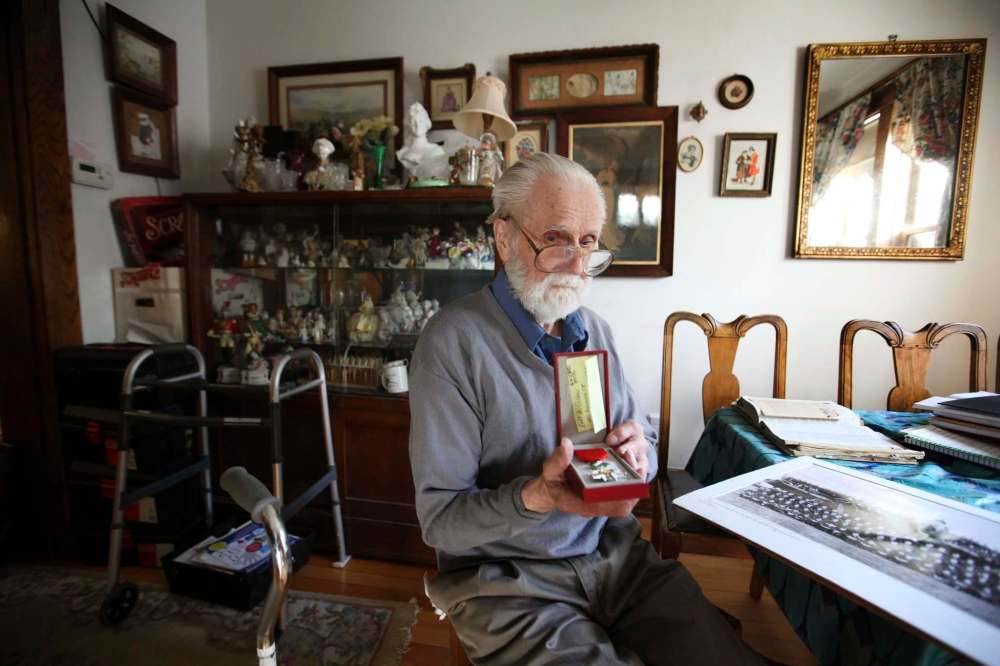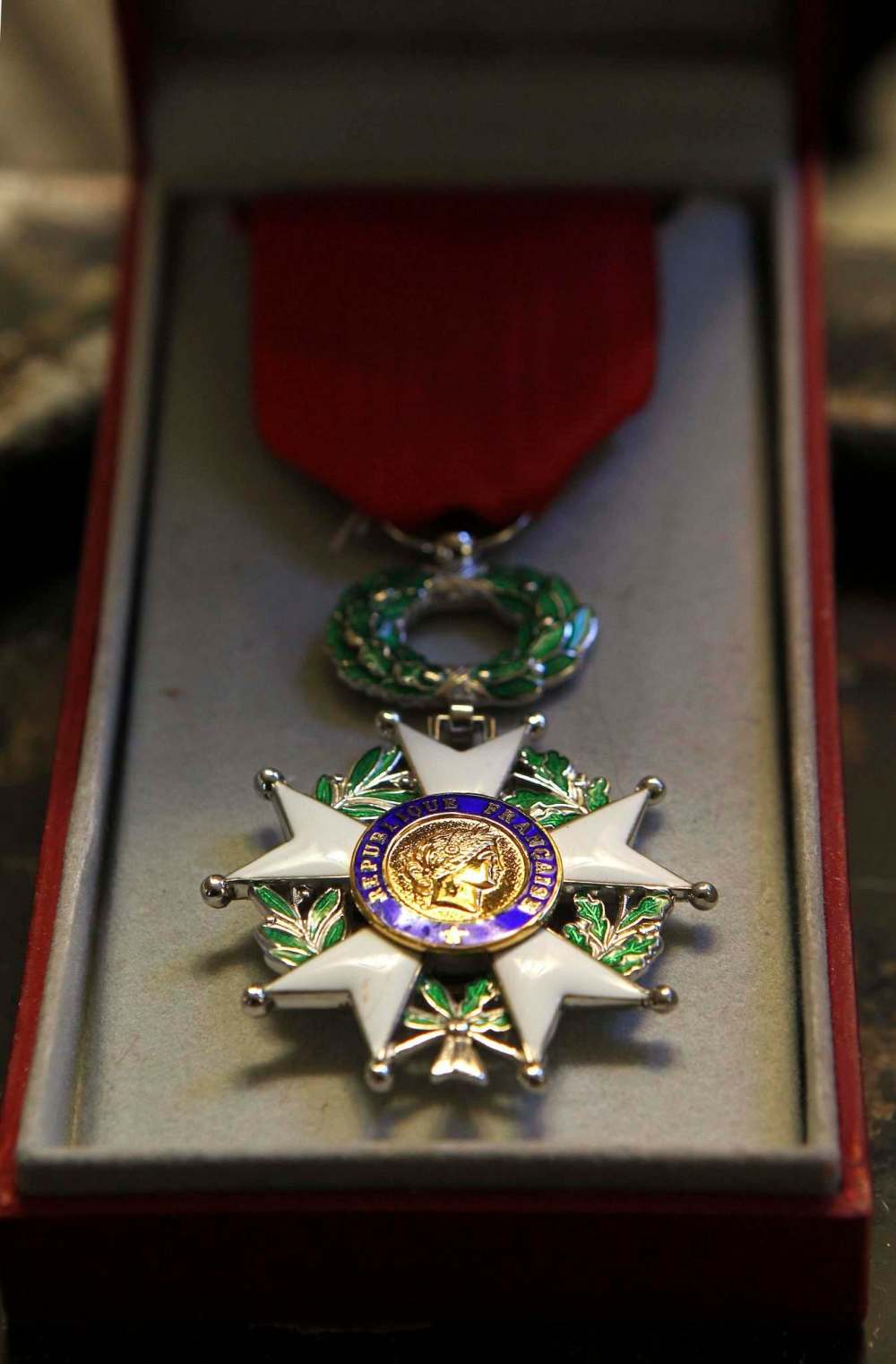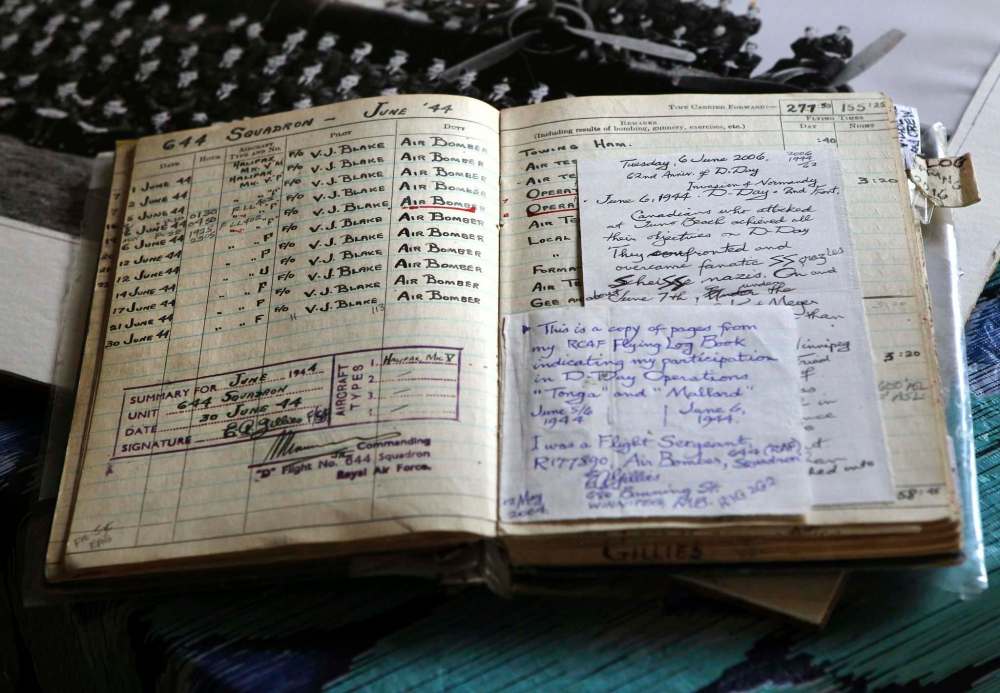Second World War airman, 95, to be awarded French Legion of Honour
'You don't get medals in the mail every day'
Advertisement
Read this article for free:
or
Already have an account? Log in here »
To continue reading, please subscribe:
Monthly Digital Subscription
$0 for the first 4 weeks*
- Enjoy unlimited reading on winnipegfreepress.com
- Read the E-Edition, our digital replica newspaper
- Access News Break, our award-winning app
- Play interactive puzzles
*No charge for 4 weeks then price increases to the regular rate of $19.00 plus GST every four weeks. Offer available to new and qualified returning subscribers only. Cancel any time.
Monthly Digital Subscription
$4.75/week*
- Enjoy unlimited reading on winnipegfreepress.com
- Read the E-Edition, our digital replica newspaper
- Access News Break, our award-winning app
- Play interactive puzzles
*Billed as $19 plus GST every four weeks. Cancel any time.
To continue reading, please subscribe:
Add Free Press access to your Brandon Sun subscription for only an additional
$1 for the first 4 weeks*
*Your next subscription payment will increase by $1.00 and you will be charged $16.99 plus GST for four weeks. After four weeks, your payment will increase to $23.99 plus GST every four weeks.
Read unlimited articles for free today:
or
Already have an account? Log in here »
Hey there, time traveller!
This article was published 23/09/2016 (3368 days ago), so information in it may no longer be current.
At the beginning, the old soldier wasn’t that interested in answering a reporter’s questions, much less having his picture taken.
“I don’t like the publicity stuff,” Emil Gillies said, waving his hand across his face.
Gillies is a 95-year-old man sitting in the living room of a 101-year-old house with his 87-year-old wife, Evelyn, and six-year-old cat, Tooney.
Their marriage turned 62 this year.
The quaint, two-storey home on Banning Street, is the only house where Gillies has ever lived. It was built by his uncle in 1915.
His life is rather uneventful these days. He loves to read and reread James Boswell’s Life of Samuel Johnson or the works of Shakespeare. There are visits from his two sons, Stephen and Christopher, and the grandchildren. Every so often, one of his buddies from the legion will pop by.

But last Christmas, something arrived in the mail that took Gillies aback.
Enclosed in a small red case marked “RF” was a French Legion of Honour medal from the Republic of France. Gillies was confused.
“You don’t get medals in the mail every day,” he said.
Here’s what happened: Last year, the French government contacted the Canadian government looking to honour any Canadian veterans who helped liberate France during the Second World War. Veterans Affairs publicized the request.
Gillies was a flying officer with the RCAF during the war, part of the 644 Squadron that took part in 16 operations in France in 1944. Only 23, Gillies was a bomb aimer, although most of his crew’s forays into occupied France were solo missions to drop supplies and agents behind enemy lines.
Sometimes, their Halifax bomber would tow and release Horsa or Halicar gliders filled with everything from small tanks to 30 to 35 troops.
Unlike the air force of today, these were four engine bombers often flown by men in their early 20s, with a year of training, flying at tree top height to avoid radar detection. They would navigate visually using maps and, if fortunate, the light of the moon.
Gillies’ crew was also involved in D-Day, part of the small group that towed gliders with commandoes, to capture the Pegasus Bridge near Caen, on the night before the invasion.
The application for the medal (unknown to Gillies) was made by John Edwards, the honour and awards chairman of the Duke of Kent Memorial Legion on McDermot Avenue.
“He (Gillies) isn’t one to play up what his role was or what he did,” Edwards said.
On Sunday, Gillies will officially be presented with the medal by French honorary consul Bruno Burnichon during a ceremony at the legion at 2 p.m. Also in attendance will be Col. Andrew Cook, the commander of 17 Wing Winnipeg and Chief Warrant Officer Michael Robertson.

It will be a small ceremony, Edwards said, because it’s a small club, with a capacity of about 30.
It’s been 72 years since Gillies was in the nose of a bomber plane flying in the dead of night trying to find drop locations while watching for enemy fighters. He has grey hair now, slicked back, and a full grey beard — a lifetime away from the photo of the young trainee airman that appeared in the Free Press in 1943.
“I was in the war but I didn’t win it, you know,” Gillies said. “There were all kinds of people. There are so many people that deserve all kinds of medals. I don’t think I’m anything special. We did our job and that was part of it.”
Still, the old veteran admitted to being “very tickled” to receive the honour. He was reluctant to talk about himself or the time his plane was ambushed by the German anti-aircraft guns over Holland, and the bomber barely limped back over the English Channel to crash land at an emergency airfield. Gillies broke his arm on the landing.
He would only say of fighting a war, “It wasn’t recommended.”
But when the conversation turned to his crew, it was another story entirely. Suddenly, the words and memories began to flow.
There was Jason “Smitty” Smith, the tail gunner, from Camrose, Alta. “He was a prize. He could smell a ME 109 (Messerschmitt German fighter).”
William Deacon operated the wireless, was from Vancouver, along with navigator Frank Darling. “He (Darling) was very religious,” Gillies quipped, dry humour still intact. “He would say, “For Chrissake, give me a pinpoint!”
The pilot, Vincent Blake, who was awarded the Distinguished Flying Cross, was from St. James.
“We were very proud, not only that we were Canadians, we were western Canadians,” Gillies said.
When they were “crewed up” in 1944, they were strangers. When their 30-plus missions were finished over France, Belgium, Germany, Norway, Holland and Denmark, they were brothers.
“Total friends,” Gillies said. “We had to depend on each other.”
Where are those young soldiers now?
“They’ve all been promoted to glory,” he said. “I’m the only one left of those wonderful people.”
After the war, they scattered back to their homes out west. They stayed in touch; wrote a few letters, paid each other a few visits, which grew fewer as time passed.
Someone asked Gillies if he thought about the men on his crew often. He paused.
“All the time,” he replied.
It was only then you could see his pale blue eyes begin to moisten.
randy.turner@freepress.mb.ca
Twitter: @randyturner15

Randy Turner
Reporter
Randy Turner spent much of his journalistic career on the road. A lot of roads. Dirt roads, snow-packed roads, U.S. interstates and foreign highways. In other words, he got a lot of kilometres on the odometer, if you know what we mean.
Our newsroom depends on a growing audience of readers to power our journalism. If you are not a paid reader, please consider becoming a subscriber.
Our newsroom depends on its audience of readers to power our journalism. Thank you for your support.


